Behind The Scenes Film
During the filming of Space: 1999, several film crews visited the studios.
In December 1974, the BBC science programme Horizon showed behind the scenes footage of the SFX and a short interview with Brian Johnson. This is now available on DVD (A&E volume 14, Carlton volume 4). More.
In October 1975, the ITV children's film programme Clapperboard devoted two half-hour episodes to Gerry Anderson's career, interviewing Gerry on the Main Mission set, Martin Bower and Brian Johnson, with detailed close ups of the special effects models.
A student film was made in 1976, and resurfaced in 2014. It appears on the Network Second Series DVD and Blu-ray (2015).
Behind the scenes footage of the SFX crew was filmed in late June 1976, and an interview with Brian Johnson in July 1976. Both these SFX scenes are available on DVD, with a new commentary by Johnson (Carlton volume 12, A&E volumes 15 and 16, Network Second Series).
Other known set visits:
A set of interviews with cast and crew was conducted on Thursday 5th August 1976. It was filmed by Mike Jackson of the ATV Promotion Department. The film reels were edited and ready for broadcast, but was never seen until 1996. These are also available on DVD (volumes 4 and 10 of the Carlton DVDs, volume 16 and the bonus disc of the A&E DVDs, Network Second Series DVD and Blu-ray). Extracts appear in The Space: 1999 Documentary (1996).
Gerry Anderson, Fred Freiberger and Barbara Bain are filmed in Pinewood, while Martin Landau, Catherine Schell and Keith Wilson are filmed on the Pinewood lot, filming A Matter Of Balance. The total running time is about 29 minutes. Landau, Bain and Anderson are all smoking through the interview.
The Landau interview is cut a little oddly; below are some extracts from his comments and some of the other interviews. The full interviews can be found on the DVDs. The Brian Johnson interview is usually presented separately, except on the Network Blu-ray.
1999 is only 23 years in the future. We're not out there by choice. Technologically and emotionally, we're not ready to go into deep space.
One of the problems of filming science fiction is not to disappoint. Radio and the literary form allows for more imagination. One of the interesting things about this show is to walk onto a new set that's been built, is not to be disappointed as a performer, and hopefully the audience won't be disappointed as well. It's a fun form, it's an exciting form, and I think it allows for a lot of allegorical aspects which a lot of contemporary drama doesn't permit.
I think they are probably much more exciting than the first series. I think the thing I like best is there is much more humanity written into the series thanks to the addition of Freddie Freiberger into our family. I think there's more humour. I think the first series had a lot of very good things going for it but I think it did lack some of the things I felt were essential to people. For instance, Barbara and I, Dr Russell and I, have a much clearer, adult, physical, emotional relationship, and there's a lot of humour in the relationship. I find that this year for instance the dialogue is not interchangeable. Last year a lot of things could have been said by anybody. I think that particular aspect is good.
There's a lot of cute and funny things. The addition of Catherine Schell as our resident alien, and Tony Anholt, and their relationship is a very interesting one and a fun one. In times of duress, people do summon up humour, and the humour is particular to the people as opposed to being general humour. They're not one-liners thrown in for laughs, there're the kind of thing that come out of people when they're in trouble.
You've spent quite a lot of time now here in Pinewood, can you tell us briefly about your average day.
Well, it starts very early in the morning, I'm picked up about 6 twenty in the morning, which is all well and good in the summer time because it's light and pretty, but very dismal and lonesome in the winter time because as you know its very dark at that time. I then in the winter also leave here in the dark, so I never do see the daylight when I'm filming here in the winter time. Obviously it's make up, hair, first thing in the morning. Lot of looking at script to see what I'll be shooting that day, though of course I've read it before and know what it is, I go over it in the morning as well. And then it's the wonder of film making, which is the constant putting together of little bits and pieces of scenes all day long, sometimes very difficult ones, sometimes not very difficult one, broken up by stopping twice for tea, once for lunch.
I gather that in this series we get to see you relaxing a lot more
We've managed to incorporate in this bunch - we're now shooting the 15th, one of our new episodes of 24 - I think in the first year we spent a lot of time finding our way just in the material itself, trying to define the characters, not being terribly successful in that area, being successful in other areas.
Are we going to see any development in the relationship between the commander and the doctor?
Yes. The commander and the doctor who were sort of looking at each other across long corridors last year, having gotten much more... mmmm... what's a good word? ... what's a nice word? ... they're crazy about each other, how's that? And it does play out.
We've now focussed on the relationships of the people, we've found where to pull in humour, and generally have a good time in-between the dramas, and that's been very rewarding for all of us. It was what we were trying to do last year, and couldn't find a way to shape it in or pull it in, and it's kinda great having a second chance to do that, we feel very good about what we've come up with this year.
You were telling us about relationships, what's it like working with your husband?
Well, we've done it before, and liked it. We did it on Mission Impossible for three years. That was not a planned situation, that was something that occurred. In doing it we found that it worked very well. We then were looking for something to do together, and many things were suggested to us, most of which lacked very much interest to us. And this particular project came along, very exciting the whole idea, the concept of it, the Andersons, the people involved, Lew Grade, and we then rose to that. It's an unusual situation, some people would find it very difficult I'm sure, nor would I suggest it for anybody, it would depend on the people and how they found it.
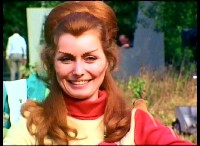
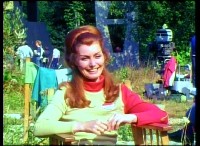
What type of things will we see you turn into?
Well, I've been a gorilla (laughs).... I've been King Kong... I've been a black leopard, various birds, I've been a mouse (giggle), a beetle (giggle), I've been a tiger, a lion, those are the animals, a dog, several kinds of dogs actually, and space creatures, weird, sort of strange wonderful creatures.
What am I doing here today? (laughs, looks round) I'm about to turn into a fox today. If you can see that animal behind me, that thing with the funny horns, I try and slip past it, by becoming a fox. That's what I'm doing today. (laughs)
It's certainly a fantastic format. I believe in this new series we're going to see some developments?
I think we're going to see a number of developments in the new series. First of all, I think we were the kind of people who take note of public reaction, and we have listened to what they've had to say, because after all our job is to entertain, and there are obviously a number of alterations, I think Fred Freiberger will describe them. The fact that these people have now been in space for some considerable time, on series two they have adjusted themselves to the new situation. They have been through time warps and therefore are in new galaxies, and it will give us an opportunity to give a new range of stories, visiting new types of planets, meeting new types of aliens and lifeforms.
At least in my view all good science fiction is based on an extension of the truth, or an extension of fact. At the time, the Americans had landed on the Moon, the technology was there, and looking into the future I decided that it wouldn't be too long before a permanent base was set up on the moon. Also we took into account the fact there is a great pollution problem on Earth, and one of the big problems as we all know is radioactive waste, so it seemed to be a good idea to take all the waste matter up to the moon and dump it up there. And then that led to the idea that there is always the human element and there could be a disaster, so we had the disaster, the big explosion, the moon developing virtually its own gigantic rocket motor, increasing its velocity and going out of orbit.
One had to consider the stories and what kind of stories we could have, and it gave us the opportunity of putting 300 people into space on a random 'trajectory', - that's a word I'm always trying to say to see if I've had too much to drink - and the fact that we have 300 people floating through space, not knowing where they're going, unable to control their course or destiny, I thought would make a pretty good premise to spin off stories from, so that's how it came about.
You come to Space 1999 with a wealth of experience, what are you going to inject into the show?
Well, we hope that we're going to air what we feel is a wonderful show, and one of the things that we would like to emphasise, which there was a dearth of it in the first series, and we thought it would be a big asset to add it to this series, is humour. We want to really get some fun into the show, show the everything in terms of the future isn't serious, always facing death and destruction, so we do want to broaden the characterisations of our people, have come across some situations that could elicit some humorous remarks, and perhaps have some situations in which they could react other than in an a grim manner,
John Koenig and Helena Russell... this year we will have their love relationship much more overt. And we will also we think round off their characters a bit more in terms of being able to laugh, cry, and be able to be perhaps a little more human in their emotions. so we don't go into the future in terms of compromising their characters to the extent that they cannot as I say cry and laugh, We will have a relationship in which they will be able to needle each other, pull each other's leg, if that's the English expression, and we'll get some fun and games out of that situation. We've changed the uniforms, the dress of our people, hoping that would make them more attractive, all the music is new, we have new main titles, much more dynamic, and we have actually changed the physical set-up of moonbase alpha, to give it a more driving kind of, just feel, a physical feel. It looks more like Cape Canaveral, or whatever, perhaps, or what your space stations might be in England, control centres, And we have people.. perhaps a more youthful look to the show in some instances, and we feel that the physical look will be a more driving kind of look, as you view the show you have a feeling of energy.
Tony Anholt we are using as our officer in charge of security and defence. He has a love-hate relationship with our alien Maya, in which they are reluctant to express their love but we do have a feeling of underlying love between them, a real ...relationship between them which is played for fun, but great concern for each other, always concerned for each other's welfare, as we hope everybody, all our format characters, will show overt concern for each other. Very much worried about the whereabouts of each and everyone of them in any kind of jeopardy situation.
Keith, you were telling me that you have one of the best design jobs in the business, why is that?
Well, I think at the moment I have, because, apart from the fact that it's being going on the last four years, it's unique in the respect that nobody can query what I do. It's science fiction, so if I design a planet or a creature, who's to say that I'm wrong? So yes, it's a very good job, because I can do exactly what I like.
What's involved in every new Space story?
Basically I read the script first. It's left very loose in the script what the planets or the creatures will be like. So it's left up to me to design something that will suit that particular story. Obviously I show the director and producers the sort of things that I'm planning, and if they agree I go ahead and do it. It's as simple as that.
This is one of your planets behind?
Yes, this one's pretty easy actually because all it says in the script is that there is a temple on an Earth type planet. Now Earth type planet's are very easy because we usually shoot them on the lot here at Pinewood or Black Park next door, or anywhere where it's trees and no buildings. So that sort of thing's pretty easy. I've had to build this temple. The inside of it we're building on the stage at the moment. So this one's pretty easy. But normally it's not so easy. If we go onto a strange planet I have to build that on stage.
Excuse me Keith, perhaps you could tell me something about this aspect of the show?
We have on this present ... we have on this present series a lot of monsters that we didn't have on the last series. As you can see this gentleman is one of our monsters. Usually they're not dressed like this, they're complete skins with fur and what have you. But this is particularly easy, because we can make him look like somebody from another planet would look. This is his costume, and he's definitely alien, there's no doubt about it. We've got to make him look strong and powerful so we find the biggest man that we can to fill the skin. And that's what he looks like. (laughs)
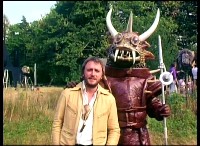
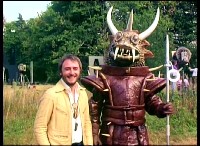
We'll go around factories looking for waste products quite a lot. Things that people normally throw away, we can use. There was an example, we went to a plastics factory, all they were doing was making plastic pipes. That was pretty boring, but I needed some plastic pipes anyway. I was walking past a room where they'd dumped all the stuff that had gone wrong, where it had melted or whatever. I thought it was fantastic. They all thought I was mad. All this waste product, this melted plastic, but it looked fabulous, it looked like strange rock, or a piece of sculpture, or anything strange. That's what we're interested in, anything that's different.
What sort of quantities are involved?
It's difficult to say we use this amount of timber or this amount of plaster, because we use so many different types of material. We use thousands and thousands of feet of timber. One of the things that we did that nobody else had done before, we built a whole series of permanent rocks, because we had moon surfaces all the time. Normally one would build a large rock out of a wooden frame covered in plaster, but ours had to last an entire series. We found that metal was cheaper. So we built all the frameworks in metal, then covered them in fibreglass. They are going to last forever. Whereas normally after a picture, things fall to pieces.
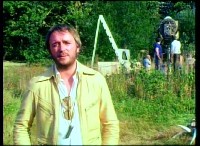
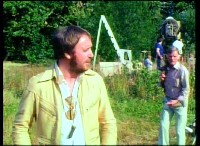
Space: 1999 copyright ITV Studios Global Entertainment